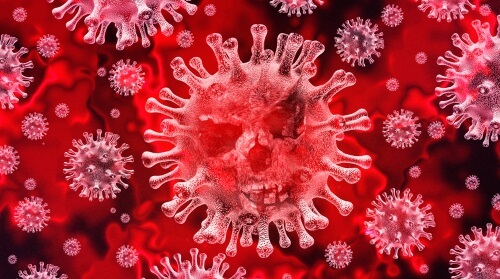
Page contents
What is Covid-19?
People can be infected with Covid-19 and never develop Covid symptoms. It can result in individuals developing long covid. For others, it is fatal.
Covid-19 is caused by a virus called coronavirus. Coronaviruses are a large family of viruses with some causing less severe disease, such as the common cold. Others cause more severe disease.
It can attack the body many ways, causing damage to the lungs, heart, nervous system, kidneys, liver and other organs.
On 31 December 2019, World Health Organization (WHO) was informed of a cluster of cases of pneumonia detected in Wuhan, Hubei Province, China. The new coronavirus was identified and named SARS-CoV-2.
How is Covid transmitted?
The government has stated: ‘Coronaviruses are mainly transmitted by large respiratory droplets and direct or indirect contact with infected secretions.
‘In addition to respiratory secretions, other coronaviruses have been detected in blood, faeces and urine.’
Covid can enter your body when you breathe it in, after someone coughs nearby or you touch a contaminated surface.
Can you recover from Covid?
Some people can be infected with Covid and never develop symptoms. Others have only mild symptoms which they can recover from.
The time between infection and having symptoms is on average five days.
It first infects the cells lining your throat, airways and lungs.
The immune system kicks in to fight the virus. This can result in the body feeling body aches, pain and fever. This as well as a cough, can be treated with drinking fluids, taking paracetamol and bed rest.
What if the disease progresses?
After seven days, if you have not recovered, your body may be struggling to cope with Covid.
Dr Nathalie MacDermott from King’s College London has said if the disease progresses, it is because the immune system is overreacting to the virus. It is creating too much inflammation.
Inflammation of the lungs is known as pneumonia. This causes the small air sacs in the lungs to start to fill with water. It can cause shortness of breath, difficulty breathing and acute respiratory distress syndrome. This can stop the body getting sufficient oxygen it needs to survive.
Some people have needed a ventilator to help them breathe.
Inflammation can damage the body and lead to septic shock when the blood pressure falls to extremely low levels. In addition, your organs will stop working.
What are the common Covid symptoms?
If you become infected with Covid, your symptoms could be mild. They may last around two weeks after which time you recover.
The most common Covid symptoms are:
- A high temperature of 37.8 degrees Celsius or above.
- New, continuous dry cough.
- Anosmia is another key symptom of Covid-19 and it occurs when your sense of smell or taste changes or disappears altogether.
If you are not able to measure your temperature, check to see if you feel hot to touch on your chest or your back.
What is long Covid?
While most people who get Covid recover quickly, you may experience long-term health problems months after initial infection.
Studies reveal that around 10–20 per cent of people infected may go on to develop symptoms that can be diagnosed as long Covid.
Long Covid has been defined by the World Health Organisation (WHO) as the continuation or development of new symptoms three months after the initial SARS-CoV-2 (Covid -19) infection.
These symptoms last for at least two months and cannot be explained by an alternative diagnosis.
What are the symptoms of long Covid?
Long Covid has been linked to over 200 symptoms and conditions. A person’s symptoms can change over time.
How do you treat it?
There is no single treatment or medication. When it comes to long Covid help, there are treatments that could relieve some of its symptoms.
Treatments may include:
• Physiotherapy for improved lung function and increased strength.
• Medication to relieve symptoms such as pain, headaches or coughs.
• Treatment for diabetes, heart disease and other serious conditions that can be affected by long Covid.
• Olfactory training to help regain sense of smell.
• Speech and language therapy to boost communication.
• Counselling for mental health issues such as anxiety and depression.
• Relaxation methods to tackle sleep problems.
Can vaccines prevent infection with Covid-19?
Getting vaccinated for Covid-19 lowers the risks of a Covid infection.
Being fully vaccinated and boosted is effective in reducing the risk of hospitalization and death.
Full vaccination can also reduce your risk of developing long Covid.
